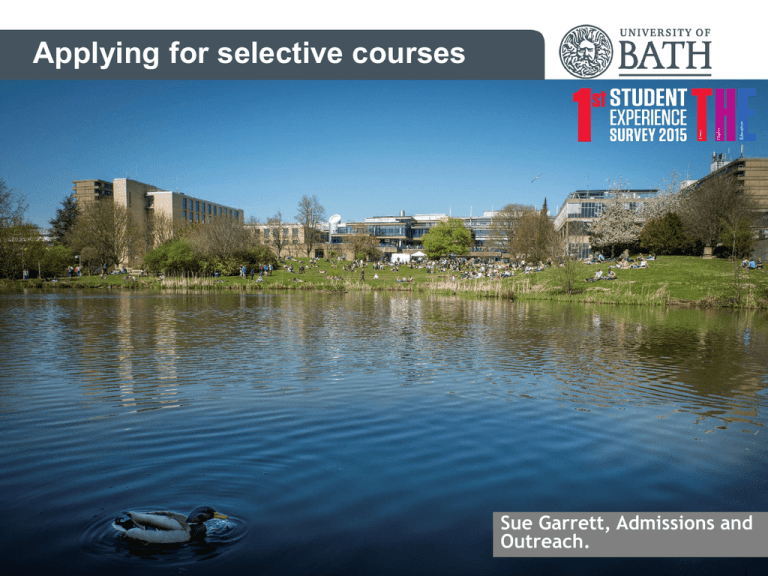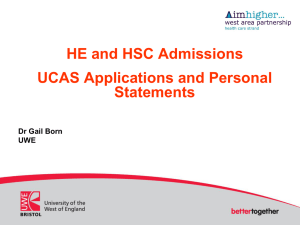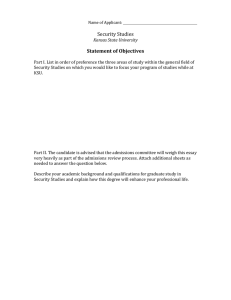Applying for selective courses Sue Garrett, Admissions and Outreach.
advertisement

Applying for selective courses Sue Garrett, Admissions and Outreach. What makes a course competitive? 1) The university reputation/ranking? E.g. Oxford or Cambridge 2) Russell group? Maybe, but some non-Russell group universities have a higher proportion of selective courses 3) Subject? E.g. Medicine 4) Number of places on the course 5) Selection procedure including test/interview/audition Always competitive? • Most early deadline courses Others vary with popularity and application numbers: • e.g. Psychology, Criminology, Chem Eng popularity trends ? • STEM subjects following STEM push in schools? • Nursing, Paramedics and other vocational courses employment/student funding concerns? • Student satisfaction? • Graduate employment/pay levels? www.hesa.ac.uk How competitive is the course? You can see % of applicants who are made an offer on comparison site university.which.co.uk What is an offer based on? From the UCAS form • • • • Academic performance – GCSE profile (plus any additional AS) Academic potential – predicated A level or IB grades Reference – this could offer important contextual information Personal Statement - examined for entry requirement essentials e.g. work experience For competitive courses it all counts plus potentially: • Interview • Portfolio • Test or additional submission of work ( Law/Maths/Oxbridge) • Additional study such as EPQ Teacher Support and References Your can tell us about: Performance subject by subject The student’s potential for further intellectual development Any restrictions or limitations in terms of the academic options available to the student Mitigating circumstances, personal problems or particular challenges the student has had to face The impact of any disability or learning need Contextual offers • A University Access agreement may include a commitment to contextual offers e.g. University of Bristol “All students from low performing schools and colleges will be flagged within the University’s admissions database and if an offer is made it will automatically be at the contextual (one grade lower) level. This will be irrespective of the predicted grades exceeding the entry requirements” University of Exeter “The educational performance of an applicant’s school or college is considered as part of the holistic assessment of an applicant’s potential to succeed at the University and may lead to a lower offer being made” Admissions statement example Mechanical Engineering at University of Bristol Early application? • Applications received by the UCAS deadline will ALL be given the equal consideration whether early or late • But early good applications may = earlier decision ( i.e. offer!) • Some students may need to apply later to build up a portfolio or gain necessary work experience • Some students benefit from an earlier school/college UCAS deadline to help motivate and prepare them for exams and beyond Applying to Bath Typical offers are based on 3 A levels with subjects and grades specified for each programme or IB with specified Higher Level requirements e.g. Mechanical Engineering A*AA including Maths and Physics or IB Overall 36 with 6 in Higher Level Mathematics and Physics and 5 in English at Standard Level (or equivalent) Use the personal statement to show us how you think and demonstrate that you also relevant skills and experience e.g. work experience for Architecture Additional study can strengthen your application for competitive programmes e.g. Extended Project Qualification We also specify GCSE requirements for some programmes Why do we value the EPQ? • Introduces the student to independent, self directed study (typically an extended essay or piece of research, around 3000 words, research diary and presentation ) • Can demonstrate a specialist interest related to choice of University programme • Prepares the student for University style study : “We welcome the introduction of the Extended Project and would encourage you to undertake one as it will help you develop independent study and research skills and ease the transition from school/ college to higher education. Completion of an Extended Project will not, however, be a requirement of any offer made.” University of Cambridge “The University is supportive of the requirement to undertake an Extended Project … It is expected that some admissions tutors may make two alternative offers to those offering this qualification, one of which involves success in the Extended Project (e.g. either AAA at A-level or AAB at A-level plus Extended Project)”. University of Bristol Is the personal statement important? • Yes! - To choose between applicants with similar predicted grades, therefore vital for competitive courses - Where entry requirements specify work experience or other non-academic skill, it must be included here - As a basis for interview - To reconsider “near misses” at confirmation - It WILL be read by at least 2 staff Clearing and adjustment • Selective universities are much less likely to have any places left to offer through clearing • Adjustment there to offer a “trade up” if you exceed your predictions, but the university still has to have some place left to offer. • If tests or interviews are part of selection, adjustment offers simply may not be possible Avoid taking a holiday around results day in year 13! Next Open day: June 16th and 17th 2016 Any questions? admissions@bath.ac.uk

